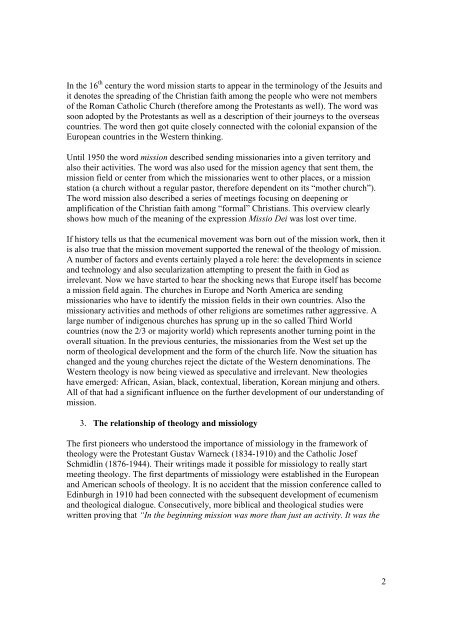The Theology of Missions
The Theology of Missions
The Theology of Missions
You also want an ePaper? Increase the reach of your titles
YUMPU automatically turns print PDFs into web optimized ePapers that Google loves.
In the 16 th century the word mission starts to appear in the terminology <strong>of</strong> the Jesuits and<br />
it denotes the spreading <strong>of</strong> the Christian faith among the people who were not members<br />
<strong>of</strong> the Roman Catholic Church (therefore among the Protestants as well). <strong>The</strong> word was<br />
soon adopted by the Protestants as well as a description <strong>of</strong> their journeys to the overseas<br />
countries. <strong>The</strong> word then got quite closely connected with the colonial expansion <strong>of</strong> the<br />
European countries in the Western thinking.<br />
Until 1950 the word mission described sending missionaries into a given territory and<br />
also their activities. <strong>The</strong> word was also used for the mission agency that sent them, the<br />
mission field or center from which the missionaries went to other places, or a mission<br />
station (a church without a regular pastor, therefore dependent on its “mother church”).<br />
<strong>The</strong> word mission also described a series <strong>of</strong> meetings focusing on deepening or<br />
amplification <strong>of</strong> the Christian faith among “formal” Christians. This overview clearly<br />
shows how much <strong>of</strong> the meaning <strong>of</strong> the expression Missio Dei was lost over time.<br />
If history tells us that the ecumenical movement was born out <strong>of</strong> the mission work, then it<br />
is also true that the mission movement supported the renewal <strong>of</strong> the theology <strong>of</strong> mission.<br />
A number <strong>of</strong> factors and events certainly played a role here: the developments in science<br />
and technology and also secularization attempting to present the faith in God as<br />
irrelevant. Now we have started to hear the shocking news that Europe itself has become<br />
a mission field again. <strong>The</strong> churches in Europe and North America are sending<br />
missionaries who have to identify the mission fields in their own countries. Also the<br />
missionary activities and methods <strong>of</strong> other religions are sometimes rather aggressive. A<br />
large number <strong>of</strong> indigenous churches has sprung up in the so called Third World<br />
countries (now the 2/3 or majority world) which represents another turning point in the<br />
overall situation. In the previous centuries, the missionaries from the West set up the<br />
norm <strong>of</strong> theological development and the form <strong>of</strong> the church life. Now the situation has<br />
changed and the young churches reject the dictate <strong>of</strong> the Western denominations. <strong>The</strong><br />
Western theology is now being viewed as speculative and irrelevant. New theologies<br />
have emerged: African, Asian, black, contextual, liberation, Korean minjung and others.<br />
All <strong>of</strong> that had a significant influence on the further development <strong>of</strong> our understanding <strong>of</strong><br />
mission.<br />
3. <strong>The</strong> relationship <strong>of</strong> theology and missiology<br />
<strong>The</strong> first pioneers who understood the importance <strong>of</strong> missiology in the framework <strong>of</strong><br />
theology were the Protestant Gustav Warneck (1834-1910) and the Catholic Josef<br />
Schmidlin (1876-1944). <strong>The</strong>ir writings made it possible for missiology to really start<br />
meeting theology. <strong>The</strong> first departments <strong>of</strong> missiology were established in the European<br />
and American schools <strong>of</strong> theology. It is no accident that the mission conference called to<br />
Edinburgh in 1910 had been connected with the subsequent development <strong>of</strong> ecumenism<br />
and theological dialogue. Consecutively, more biblical and theological studies were<br />
written proving that “In the beginning mission was more than just an activity. It was the<br />
2

















